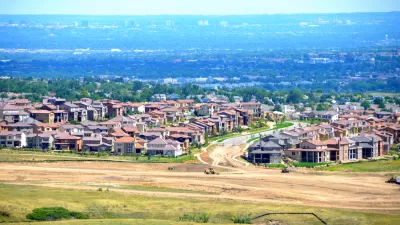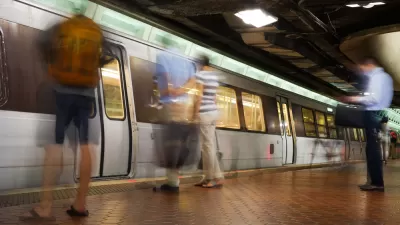The country cannot hope to achieve its goals for the reduction of greenhouse gas emissions without fundamentally rethinking its land use and development patterns, according to this article.

The Biden administration in April announced a bold target to reduce the country's greenhouse gas emissions by 50 percent from 2005 levels by the end of this decade. A recent report by researchers at the Brookings Institution argues that those targets won't be possible without systems-level changes in very sector of the economy, and unfortunately, the strategy announced by the Bien administration only skimmed over a "central driver of the climate crisis": unsustainable land use practices.
Adie Tomer, Joseph W. Kane, Jenny Schuetz, and Caroline George write to recenter land use in climate discussions, stating that the country won't achieve its goals to reduce greenhouse gas emissions by continuing to grow as it has in the past.
"After decades of sprawl, the U.S. has the dubious honor of being a world leader in both building-related energy consumption and vehicle miles traveled per capita. Making matters worse, lower-density development also pollutes our water and requires higher relative emissions during the initial construction," reads the article.
As a prescription for the consequences of the history of land use in the United States, the article proposes: "We must prioritize development in the kinds of neighborhoods that permanently reduce total driving and consume less energy."
"Such human-centered neighborhoods have the added benefit of helping us adapt to climate impacts, improve public health, and promote access to activities. Encouraging their development should be a central part of any national climate resilience strategy," continues the article.
Environmentalists have long connected sprawling development patterns to negative environmental outcomes like air pollution, but the connections between sprawl and the emissions that cause climate change tend to be underappreciated, or deliberately ignored, by even some of the most ardent environmentalists. The international community, led by the United Nations, has recently amplified the blame for climate change on the appetite in the United States for large, gas guzzling automobiles and sprawling development patterns.
FULL STORY: We can’t beat the climate crisis without rethinking land use

Maui's Vacation Rental Debate Turns Ugly
Verbal attacks, misinformation campaigns and fistfights plague a high-stakes debate to convert thousands of vacation rentals into long-term housing.

Planetizen Federal Action Tracker
A weekly monitor of how Trump’s orders and actions are impacting planners and planning in America.

San Francisco Suspends Traffic Calming Amidst Record Deaths
Citing “a challenging fiscal landscape,” the city will cease the program on the heels of 42 traffic deaths, including 24 pedestrians.

Defunct Pittsburgh Power Plant to Become Residential Tower
A decommissioned steam heat plant will be redeveloped into almost 100 affordable housing units.

Trump Prompts Restructuring of Transportation Research Board in “Unprecedented Overreach”
The TRB has eliminated more than half of its committees including those focused on climate, equity, and cities.

Amtrak Rolls Out New Orleans to Alabama “Mardi Gras” Train
The new service will operate morning and evening departures between Mobile and New Orleans.
Urban Design for Planners 1: Software Tools
This six-course series explores essential urban design concepts using open source software and equips planners with the tools they need to participate fully in the urban design process.
Planning for Universal Design
Learn the tools for implementing Universal Design in planning regulations.
Heyer Gruel & Associates PA
JM Goldson LLC
Custer County Colorado
City of Camden Redevelopment Agency
City of Astoria
Transportation Research & Education Center (TREC) at Portland State University
Jefferson Parish Government
Camden Redevelopment Agency
City of Claremont





























